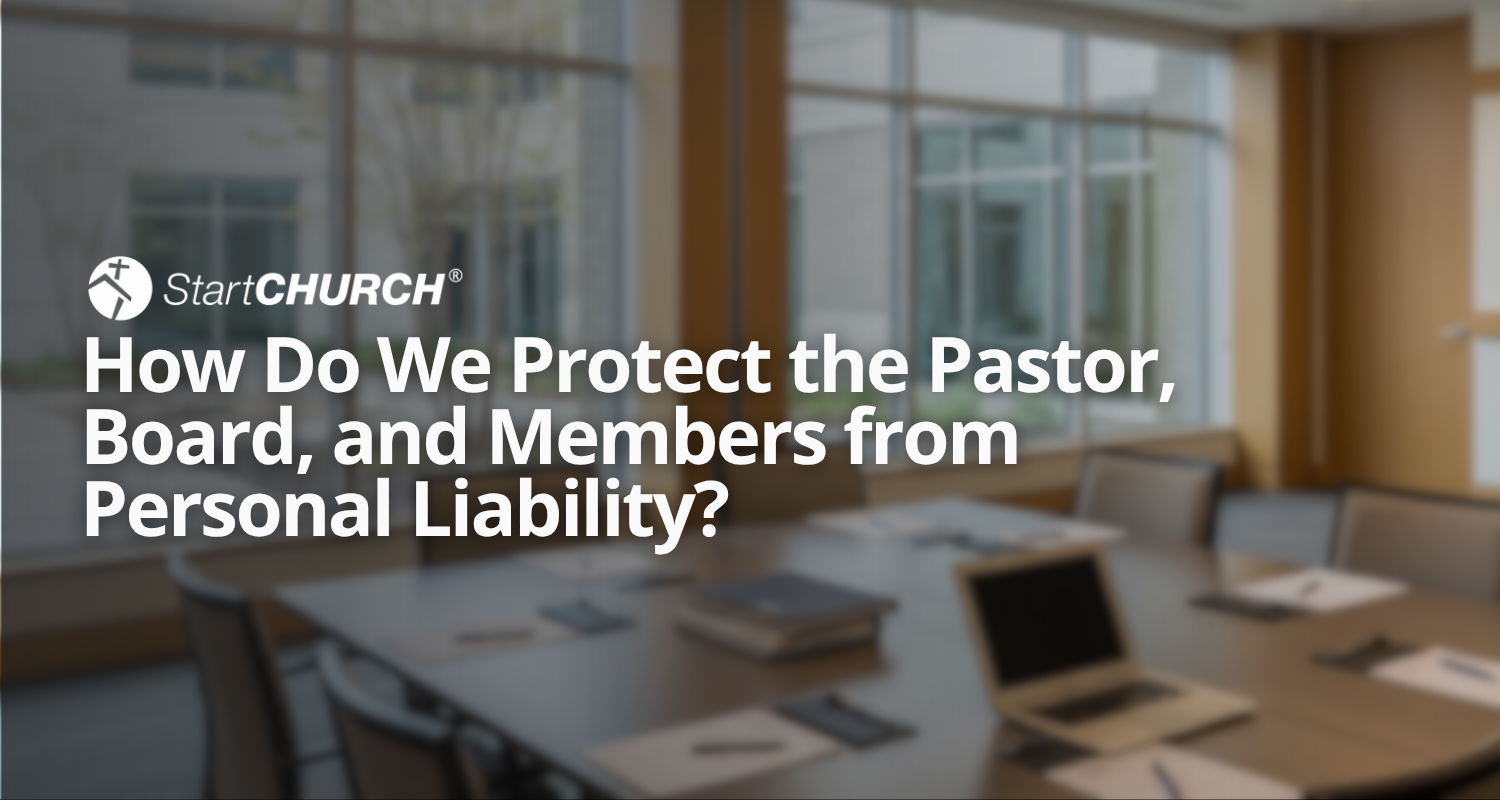How Do We Protect the Pastor, Board, and Members from Personal Liability?
By Brandon Williams, VP of Marketing

Building a Foundation of Stewardship and Protection
Pastors and church leaders are called to shepherd God’s people. Yet in today’s world, protecting the church legally is just as important as nurturing it spiritually. Proverbs 27:12 says, “The prudent see danger and take refuge, but the simple keep going and pay the penalty.”
This verse reminds us that wisdom and faith work together. Protecting your church from personal liability is not a lack of faith. It is an act of stewardship. When pastors and board members are properly covered, they can lead with confidence and peace of mind.
1. Incorporate Your Church
The first step toward legal protection is incorporation. When a church incorporates, it becomes a separate legal entity. This means that the church, not its leaders or members, carries liability for its actions.
Without incorporation, individual pastors or board members could be held personally responsible for legal or financial issues. Incorporation creates what is called the corporate veil, which protects individuals from personal liability.
Incorporation also communicates professionalism and accountability. It signals to donors, banks, and your community that your church operates with integrity.
StartCHURCH helps pastors file articles of incorporation that meet state requirements and align with the church’s mission. This simple yet vital step establishes the first layer of legal protection.
2. Adopt Clear and Current Bylaws
Bylaws are your church’s rulebook. They outline leadership structure, beliefs and doctrine, voting procedures, and accountability systems. Updated and well-drafted bylaws show that your church operates responsibly and under clear governance.
When bylaws are missing, outdated, or incomplete, confusion can arise during moments of conflict or transition. Without them, the corporate veil can weaken, leaving leaders more exposed to personal risk.
Your bylaws should reflect your current ministry operations. They should define how decisions are made, who has authority to act on behalf of the church, and how conflicts are resolved.
At StartCHURCH, we guide pastors through the process of creating bylaws that not only protect the church but also reflect its heart for ministry.
3. Maintain Proper Insurance Coverage
Insurance is another layer of wisdom and stewardship. While incorporation separates your church from personal liability, insurance provides financial protection against unforeseen events.
Here are the most common types of insurance for churches:
- General Liability Insurance: Covers accidents or injuries that occur on church property.
- Property Insurance: Protects buildings, furniture, and equipment.
- Directors and Officers (D&O) Insurance: Shields board members and officers from personal lawsuits related to decisions made in their roles.
4. Keep Accurate Records and File Required Reports
Proper recordkeeping is both a spiritual and legal discipline. Luke 16:10 says, “Whoever can be trusted with very little can also be trusted with much.”
Keeping detailed records of meetings, financial transactions, and ministry activities demonstrates integrity and transparency. It also preserves your church’s liability protection by demonstrating that decisions are made in accordance with policy.
Every incorporated church should maintain:
- Minutes from board meetings
- Annual reports and filings with the state
- Financial records and donation receipts
- Housing allowance resolutions for staff
5. Avoid Private Benefit and Political Involvement
To maintain both your legal standing and tax-exempt status, your church must operate for religious and charitable purposes. No individual or private party should personally profit from church income.
Additionally, churches must refrain from engaging in political campaigning or endorsing specific candidates. The church’s voice should remain focused on the gospel. To better understand how the IRS views political speech and what it means for your ministry, we invite you to read this blog.
By staying within IRS and state boundaries, your church remains both compliant and credible.
6. Partner with Experts Who Understand Ministry
Protecting your church legally can feel overwhelming, especially when your heart is focused on ministry. That is why having the right partners matters.
StartCHURCH specializes in helping pastors and church boards navigate incorporation, bylaws, and compliance. Our goal is to help you protect what God has entrusted to you so you can serve boldly and without fear.
As Proverbs 24:3 wisely reminds us, “By wisdom a house is built, and through understanding it is established.” When you build your church with both spiritual faith and legal understanding, you create a ministry that stands firm for generations to come.
%schedule-a-call-cta%

